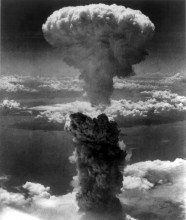
After escalation of tension between nuclear armed India and Pakistan near Line of Control (LoC), police in Indian administered Kashmir has issued an advisory of do’s and don’ts in case of a nuclear war.
Srinagar, Jan 22/Nationalturk – After recent tension between the nuclear armed neighbors India and Pakistan near Line of Control (LoC), the defacto border between India and Pakistan in Indian administered Kashmir, police in Indian administered Kashmir has issued an advisory of do’s and don’ts in case of a nuclear war.
The public advisory issued by police in a local English newspaper elaborates about steps people should take in case there is a nuclear war.
The tension between Indian and Pakistan, who both possess nuclear weapons, has increased recently over incursions at LoC. Since January 6, at least five soldiers – three Pakistanis and two Indian army men – have been killed in cross-border firing. India and Pakistan have been observing ceasefire along LoC in Kashmir since November 2003. Despite some aberrations, the ceasefire has been holding.
LoC skirmishes have increased tension between India, Pakistan
The latest skirmishes at LoC have increased tension between the two countries and India has resorted to tough posturing following beheading of its two soldiers allegedly by Pakistani army men in Poonch sector of Kashmir.
“People should construct basements for nuclear war. In case no basement was available, people should construct bunkers as in conventional war in an open space in front of the house as some protection was better than no protection,” police advisory reads.
It said several types of nuclear, biological and chemical weapons are doubted to be in existence in the international field. It listed Bacillus Anthracis, Salmonella Typhose, Pastreurella and Pestis among other biological weapons. It also listed nerve gas (tabun, sarin), blister gas (mustard, lewisite) and chocking gas (phosgene, chlorine chloropicrin) among the chemical weapons.
The advisory further reads, “If a person was in open during nuclear attack, he/she should immediately drop to ground and remain in lying position. The persons should protect his eyes and face by covering it with his/her hands and at the same time and he/she is advised to protect his ears with fingers to prevent ear drum rapture”.
“Stay down after the initial shock wave, wait for the winds to die down and debris to stop falling. If blast wave does not arrive within five seconds of the flash you were far enough from the ground zero and initial radiation exposure will not exceed 150 rads,” it adds.
The advisory advised people to “stay calm” and stay down under cover until debris stop falling. “The blast wind generally ends in one or two minutes after burst and burns, cuts and bruises are no different than conventional injuries.”
It also advised people, who may be travelling in vehicles at the time of a nuclear attack, to stay down under cover until debris stop falling.
“Don’t panic and stay calm in case of a nuclear, biological or chemical attack,” added the advisory.
Write your comments and thoughts below
Faiz Ahmad / NationalTurk India News
[adrotate banner=”46″]

